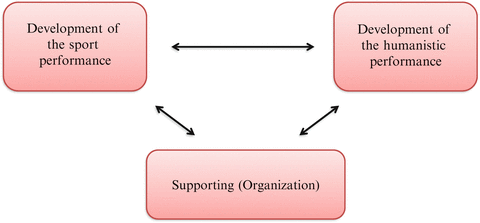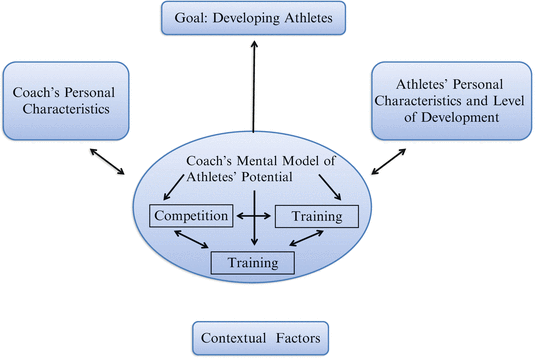Author
Theme
sport
Components
Côté et al. (1995a)
Coaching model (knowledge)
Gymnastics
Competition, training, organization,
Coach’s personal characteristics,
Gymnast’s personal characteristics and level of development, contextual factors
Côté et al. (1995b)
Knowledge
Gymnastics
Minimally involved in competition,
Coach involvement in training, intervention style, technical skills, mental skills,
Simulation: Teaching progressions, being supportive, helping athletes to deal with stress
Kitamura et al. (2005)
Coaching model
Football
Training, motivating, supporting.
Koga and Horino (2012)
Coaching model
Soccer
Development of life skill,
Development of performances,
Coaches’ behavior and approach
Katoh and Horino (2011)
Coaching model
Soccer
Sincere attitudes for anything
Supporting humanistic education
Nash et al. (2011)
Coaching practice
Multi sports: individual & team sports
Long-term approach,
Authentic coaching environment
Creating a learning environment
Quality and quantity of training sessions
Bennie and O’Connor (2010)
Coaching philosophy
Rugby, cricket
Player development on and off the field,
Role of the coach, develop the player and the person,
Educate the players, not purely focused on results
Bennie and O’Connor (2011)
Coaching model
Rugby, cricket
The coach, coaching skill, the environment
Abraham et al. (2006)
The coaching process: the coaching schematic
Multi sports: individual & team sports
Roles, goals, typical actions,
Required knowledge,
Support for the schematic,
Factors influencing development.
Côté and Sedgwick (2003)
Coaching behavior
Rowing
Plan proactively, create a positive training environment
Facilitate goal setting, Build athletes’ confidence
Teach skills effectively,
Recognize individual differences
Establish a positive rapport with each athlete.
Bloom et al. (1997)
Routines
Basketball, field hockey, ice hockey, volleyball
Game-day routines for coach and team,
Coaches’ emotions and behaviors,
Team meeting, game evaluation
Bloom and Salmela (2000)
Personal characteristics
Basketball, field hockey, ice hockey, volleyball
Desire to learn,
Ways of acquiring knowledge,
Personal approach to coaching
d’Arripe-Longueville (1998)
Effectiveness of interactions between coaches and athletes
Judo
Stimulating interpersonal rivalry,
Provoking athletes verbally, displaying indifference
Entering into direct conflict, showing preferences
Developing specific team cohesion
Irwin et al. (2004)
Origin of coaching knowledge
Gymnastics
Mentor coaches, trial and error/experimentation,
Past experiences, coaching courses, squad sessions, observation, coaching manuals, foreign coaches,
Côté and Gilbert (2009)
Definition and required for expertise
Artistic gymnastic
Coaches’ knowledge,
Athletes’ outcomes,
Coaching contexts
29.3.2 Early Researches
In the pioneer study of Côté et al. (1995a), they conducted semi-structured interviews, in-depth and open-ended, with 17 expert gymnastics coaches who were involved producing Olympic level athletes. The goal of the investigators was to conceptualize the coaches; knowledge. They analyzed their qualitative data utilizing the grounded theory methodology (Glaser and Strauss 1967; Strauss and Corbin 1990). As shown in Fig. 29.1, six components emerged from their analysis. As a result, they proposed a model of the cognitive processes of expert coaches, entitled the “Coaching model”. Côté et al. proposed that the coaching process (knowledge) was categorized into three central components: competition, training, and organization. Moreover, they denoted three variables. These were the coach’s personal characteristics, the athletes’ personal characteristics and level of development. They also proposed some contextual factors, which were defined as peripheral components. Their stated goal was to aid in the development of athletes by creating a model describing how expert coaches function Fig. 29.2.


Fig. 29.2
The key components in the coaching process of expert coaches
Using a similar qualitative analysis, Côté et al. (1995b) also investigated the knowledge base of expert coaches. They revealed that expert coaches were minimally involved with the athletes in competition and but in training they were involved with teaching progressions, being supportive, and helping athletes to deal with stress. Succeeding researchers generally utilized the procedure of Cote et al. (1995a, b) to investigated, identify, and conceptualize the coaching processes of expert coaches. The conceptualization of the cognitive process was expanded to team sports by Bennie and O’Connor (2011).
Kitamura et al. (2005) demonstrated that coaching model (coaching mental model) of expert high school youth football coaches was comprised of three categories: training, motivating and supporting. Koga and Horino (2012) performed a study to compare professional youth football clubs to high school football clubs. They found no difference in the coaching model that described coaches at the two levels. The coaching model of expert youth coaches consisted of three categories: development of life skill, development of performance, and the coaches’ behavior and approach. Katou and Horino (2014) also investigated the coaching model of local youth coaches at the final 16 in a prefectural tournament. The coaching model for these coaches consisted of three components: diligent attitudes for football, supporting, and humanistic education. Although the components’ names were different among the three studies, the youth coaches all regarded training (development of the sport performance), education (development of a humanistic performance), and support (organization of environment) as key components of their coaching process. “The humanistic performance” involves a holistic embraces of abilities that allow the players to make emotional, psychological, and social adjustments which allow them to adequately deal with various situations and in the achievement of their goals. From the above conceptualizations, it is clear that the extracted components of each coaching model are very similar to each other. Despite differences of the club attributes and the competition level, the coaching models of youth coaches have similar characteristics in that they regard the development of a humanistic performance as an essential part of youth development along with the sport performance. The expert coaches instructed and supported their athletes in the development of both athletic and humanistic performance.
Stay updated, free articles. Join our Telegram channel

Full access? Get Clinical Tree









